Running a successful agency means juggling client relationships, project deadlines, and new business pitches. While Salesforce is a powerhouse for managing client data, unlocking its true potential and giving your team back precious hours requires the right automation. Agencies today face immense pressure to deliver results efficiently, but manual data entry, inconsistent note-taking, and disjointed follow-up processes create bottlenecks that kill productivity and risk client satisfaction.
This guide is built specifically for agency leaders and teams who want to move beyond basic CRM usage. We'll explore the 12 best Salesforce automation tools designed to streamline your workflows, from capturing critical client feedback automatically to ensuring every action item is tracked and assigned. You will discover platforms that can transform your client management, improve project handoffs, and boost your sales team's effectiveness.
Each review provides an honest assessment of features, specific agency use cases, pricing, and integration details to help you make an informed decision. We include screenshots and direct links, so you can evaluate the best fit for your agency's unique needs. It's time to equip your agency with the tools that not only manage relationships but actively build them through intelligent automation.
1. Scribbl: For Automating Client Call Intelligence into Salesforce
For agencies looking to drive efficiency, Scribbl stands out as a powerful AI meeting assistant that automates client intelligence workflows directly into Salesforce. Its core function is to transcribe, summarize, and analyze client calls, turning conversations into structured, actionable data without manual effort. What makes Scribbl particularly effective for sales and account teams is its bot-free Chrome extension for Google Meet, which ensures a natural meeting flow without an intrusive AI participant.
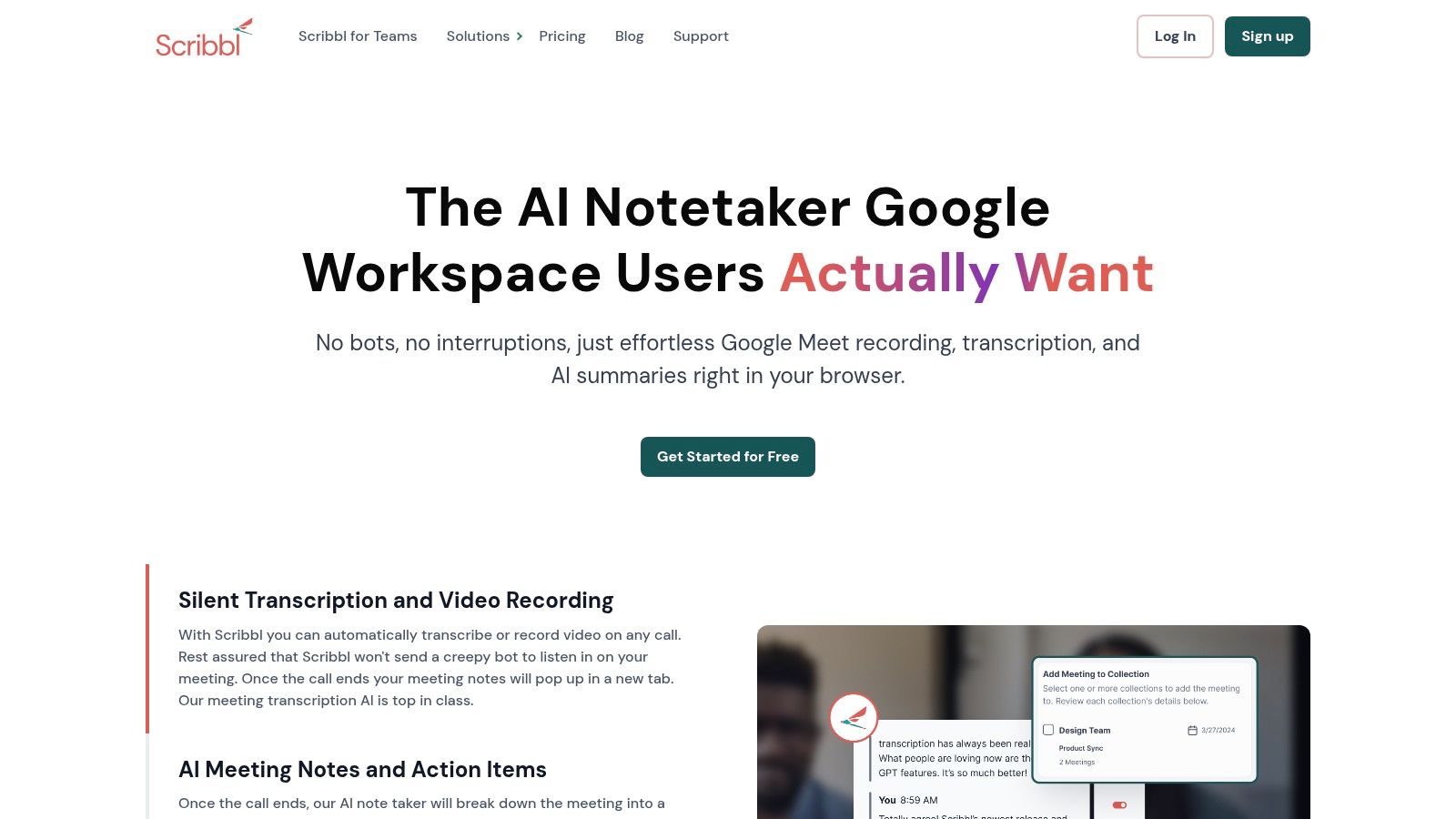
This tool excels by automatically identifying key discussion topics, action items, and client sentiment, saving account and project managers hours of post-call administrative work. Beyond meeting summarization, AI can also fully automate aspects of your agency's phone communications. Learn more about how AI can handle your phone calls to further streamline client interactions.
Why Scribbl Excels for Agency Salesforce Automation
Scribbl's deep integration capabilities make it one of the most practical Salesforce automation tools for client-facing teams. After a sales discovery call or client check-in, the platform can automatically push a concise meeting summary, key action items, and detected upsell opportunities directly into the relevant Salesforce opportunity or contact record. This ensures your CRM is always up-to-date with the latest client intelligence, eliminating manual data entry and reducing the risk of missed follow-ups.
- Key Strengths: Bot-free, privacy-first recording; advanced AI analysis of meeting content; seamless workflow automation with Salesforce and other project management tools (Asana, Monday.com).
- Primary Use Case: Automating the entire post-meeting workflow for agency sales and account management teams, from note-taking and summarization to CRM updates and task creation.
- Pricing: Offers a generous free-forever plan with 15 meeting credits per month. Team plans unlock advanced features like a shared meeting library and enhanced admin controls.
- Limitations: Currently focused on Google Meet, though Zoom and Microsoft Teams support are on the roadmap.
2. Salesforce Sales Cloud: For Building a Foundational Agency CRM
Salesforce Sales Cloud is the foundational platform for countless agencies, acting as the central nervous system for sales operations. It’s the industry-standard CRM, offering native Salesforce automation tools designed to manage the entire client lifecycle, from initial lead capture to closing complex, multi-stakeholder deals. For agencies, this means a unified view of every prospect, client project, and upsell opportunity, all within a single, scalable environment.
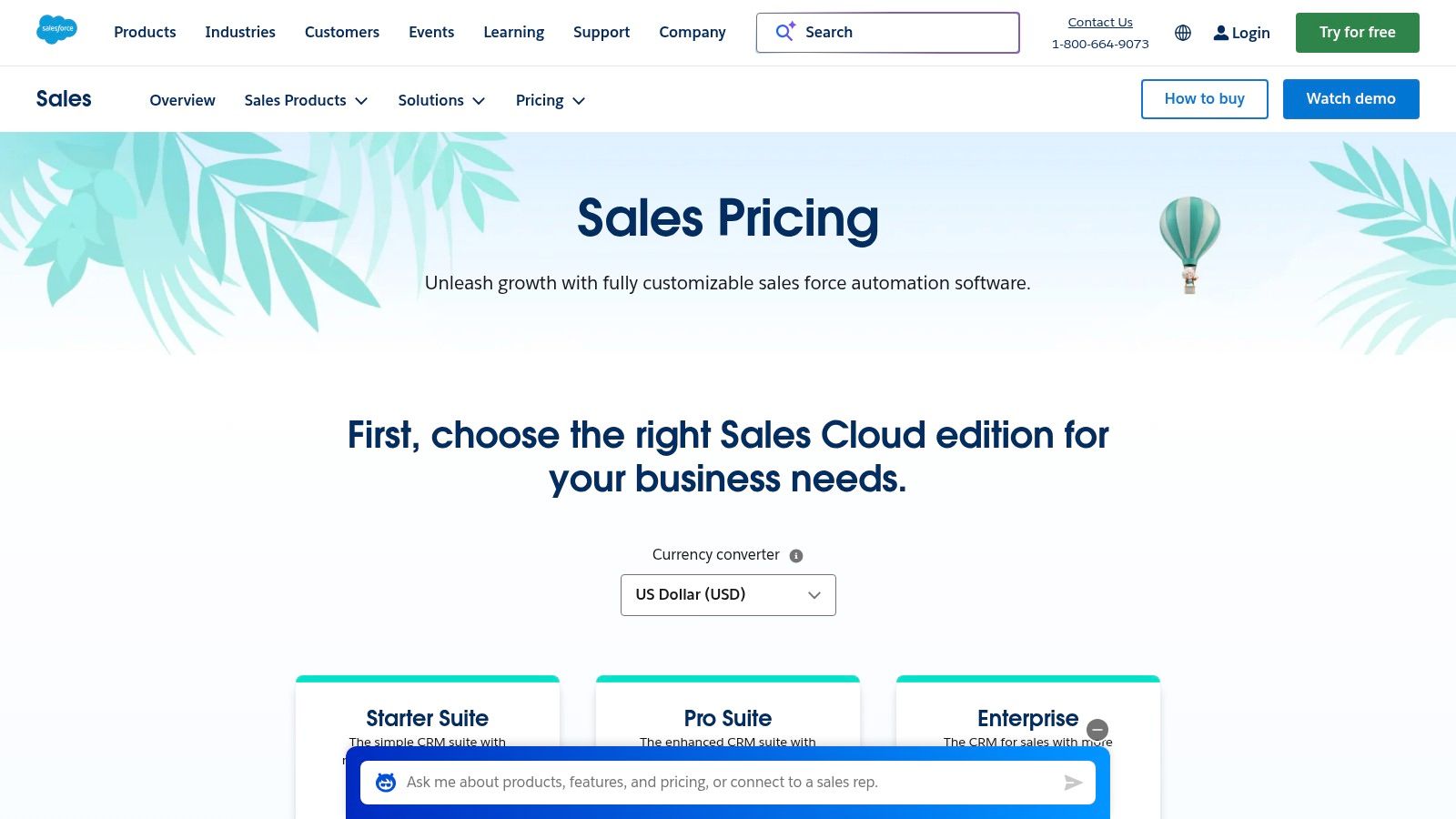
The platform excels at creating structured sales processes. Agencies can build custom pipelines that reflect their unique sales cycles, automate lead assignments to the right account manager, and set up reminders for critical follow-ups. Understanding its core features is essential for anyone looking to optimize their agency's sales engine. You can explore a deeper dive into what workflow automation is and how it applies here.
Key Considerations for Agencies Using Sales Cloud
- Pricing Structure: Tiers range from Starter ($25/user/month) to Unlimited ($500/user/month), with higher tiers unlocking advanced automation, forecasting, and AI features like Einstein Conversation Insights.
- Best For: Agencies of all sizes, but its true power and scalability are best realized by mid-market and enterprise agencies with dedicated admin resources.
- Pros: Unmatched customization, a massive AppExchange ecosystem for extending functionality, and robust security make it a reliable choice for managing sensitive client data.
- Cons: The total cost of ownership can be high, and the initial setup requires significant expertise, often necessitating a certified consultant for complex agency workflows.
Website: salesforce.com
3. HubSpot Sales Hub: For an All-in-One Agency Sales & Marketing Platform
HubSpot Sales Hub is a powerful sales CRM platform known for its user-friendly interface and tight integration with marketing and service tools. For agencies, it streamlines the entire sales process, from automating personalized email sequences to managing deals in a visual pipeline. Its strength lies in providing an all-in-one solution that reduces the need for multiple disparate systems, offering a unified view of the customer journey.
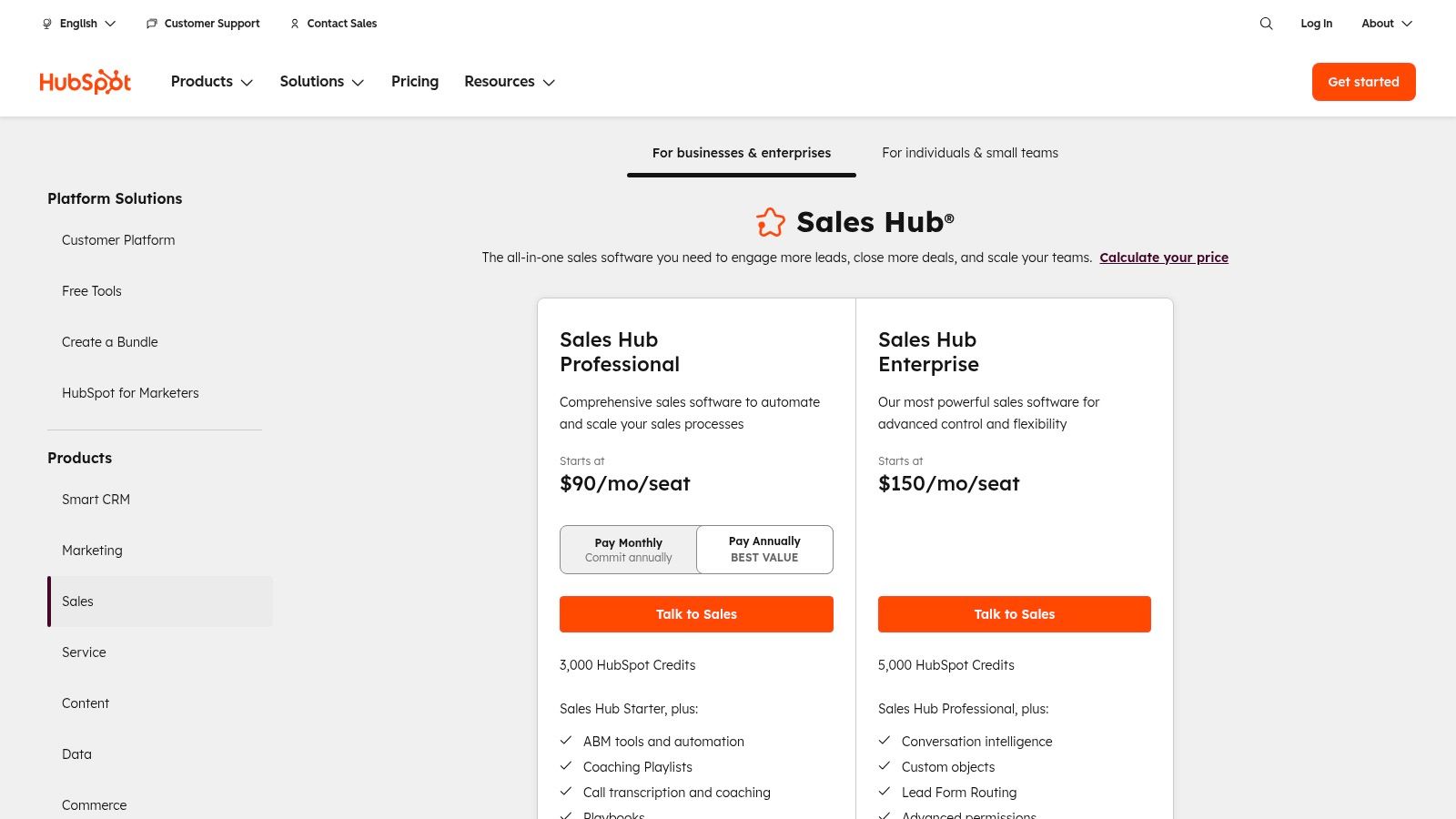
The platform is designed for rapid adoption, allowing agency teams to quickly build and automate workflows without extensive technical expertise. Sales Hub’s automation capabilities, like lead rotation and task creation, ensure that no opportunity is missed. It stands out among Salesforce automation tools for its accessibility, especially for teams that need a fast and intuitive setup to begin tracking quotes, creating playbooks, and forecasting revenue.
Key Considerations for Agencies Using HubSpot
- Pricing Structure: Offers a free tier with basic tools. Paid plans range from Starter (starting at $15/user/month) to Enterprise (starting at $150/user/month), with mandatory onboarding fees for Professional and Enterprise tiers.
- Best For: Small to mid-market agencies seeking a fast time-to-value and an intuitive user experience without the need for a dedicated administrator.
- Pros: The intuitive UX and rich educational resources (like HubSpot Academy) enable quick team adoption. The free tools provide a smooth entry point with a clear upgrade path.
- Cons: The total cost can escalate quickly as an agency adds more seats or integrates additional hubs (Marketing, Service), making it less cost-effective at scale compared to some competitors.
Website: hubspot.com
4. Microsoft Dynamics 365 Sales: For Agencies Embedded in the Microsoft Ecosystem
Microsoft Dynamics 365 Sales is a formidable alternative in the sales force automation landscape, particularly for agencies already integrated into the Microsoft ecosystem. It acts as a comprehensive sales platform offering robust lead and opportunity management, forecasting, and AI-powered assistance through its Copilot features. For agencies using Microsoft 365, this means unparalleled native integration with tools like Outlook, Teams, and Excel, creating a fluid workflow between communication and CRM data entry.
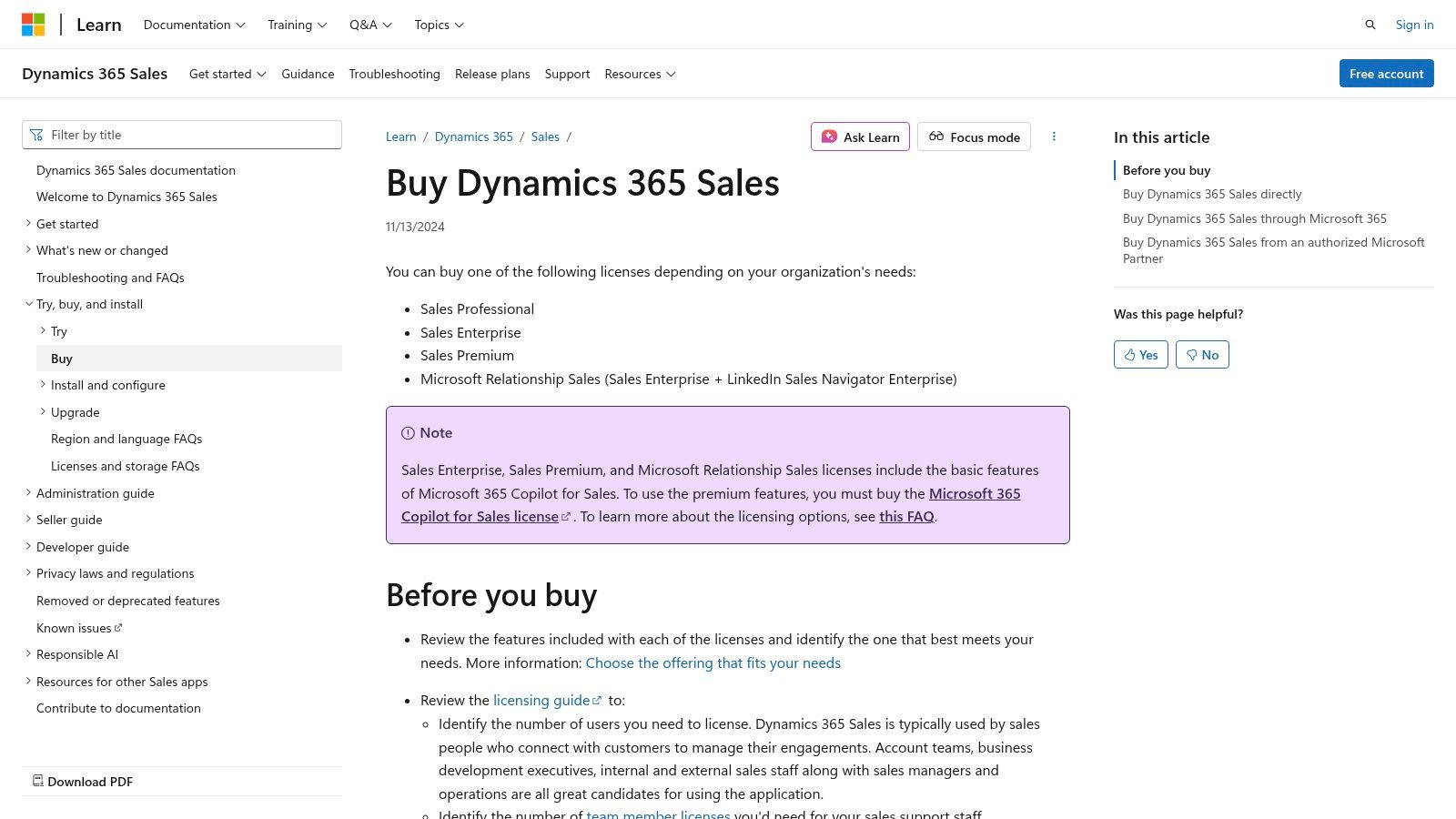
The platform enables agencies to streamline sales processes by automating tasks directly within the tools their teams use daily. Its deep connection with Power BI and Dataverse provides sophisticated analytics and reporting, allowing agency leaders to track pipeline health and client engagement with precision. The native alignment with familiar Microsoft applications reduces the learning curve and context-switching, making it a powerful contender among Salesforce automation tools for agencies seeking efficiency.
Key Considerations for Microsoft-Powered Agencies
- Pricing Structure: Multiple editions are available, including Professional (starting at $65/user/month) and Enterprise ($95/user/month), with pricing evolving as AI Copilot features become more integrated into Microsoft 365 bundles.
- Best For: Agencies heavily invested in the Microsoft 365 stack (Outlook, Teams, SharePoint) that want seamless, out-of-the-box integration between their sales and productivity tools.
- Pros: Exceptional native integration with Microsoft products, flexible licensing options through a large partner ecosystem, and powerful analytics capabilities with Power BI.
- Cons: The platform's configuration can be complex for new administrators, and the total cost can vary significantly depending on the edition and evolving Copilot bundles.
Website: learn.microsoft.com
5. Zoho CRM: For a Cost-Effective, All-in-One Agency CRM
Zoho CRM is a powerful and full-featured platform that offers agencies robust sales force automation at an exceptionally competitive price point. It stands out as a strong alternative for businesses seeking extensive functionality without the enterprise-level investment. Agencies can leverage its tools to automate everything from lead nurturing to complex deal flows, ensuring sales teams can focus on client relationships instead of manual data entry. The platform's 'Zia' AI assistant provides predictive insights and task reminders, adding a layer of intelligence to daily operations.
The system’s "Blueprints" feature allows agencies to design and enforce specific sales processes, ensuring consistency across the team. As part of a massive ecosystem of business apps, its native integration capabilities are a major draw. For a deeper understanding, you can explore the benefits of a well-executed CRM integration strategy and how it streamlines agency workflows. Zoho CRM delivers a comprehensive suite of salesforce automation tools that scale with an agency’s growth.
Key Considerations for Agencies Using Zoho
- Pricing Structure: Offers several tiers, including a free plan. Paid plans range from Standard ($14/user/month) to Ultimate ($52/user/month), making it highly accessible for growing agencies.
- Best For: Small to mid-sized agencies that need a cost-effective, all-in-one CRM with powerful automation features and the ability to integrate seamlessly with other business tools.
- Pros: Very competitive pricing with rich features at lower tiers, excellent scalability from free plans to enterprise, and strong mobile app functionality for teams on the go.
- Cons: Advanced AI and deep customization features are reserved for higher-tier plans, and the extensive options can become complex for non-technical users to manage as an agency grows.
Website: zoho.com/crm
6. Pipedrive: For Visual Pipeline Management in Creative Agencies
Pipedrive is a sales-focused CRM renowned for its visually intuitive, drag-and-drop pipeline management. For agencies, this translates to an exceptionally easy-to-adopt platform where account managers can track deal progress from pitch to signed contract with minimal training. Its core strength lies in simplifying complex sales cycles, making it a powerful tool for teams that need to focus on selling rather than navigating cumbersome software.
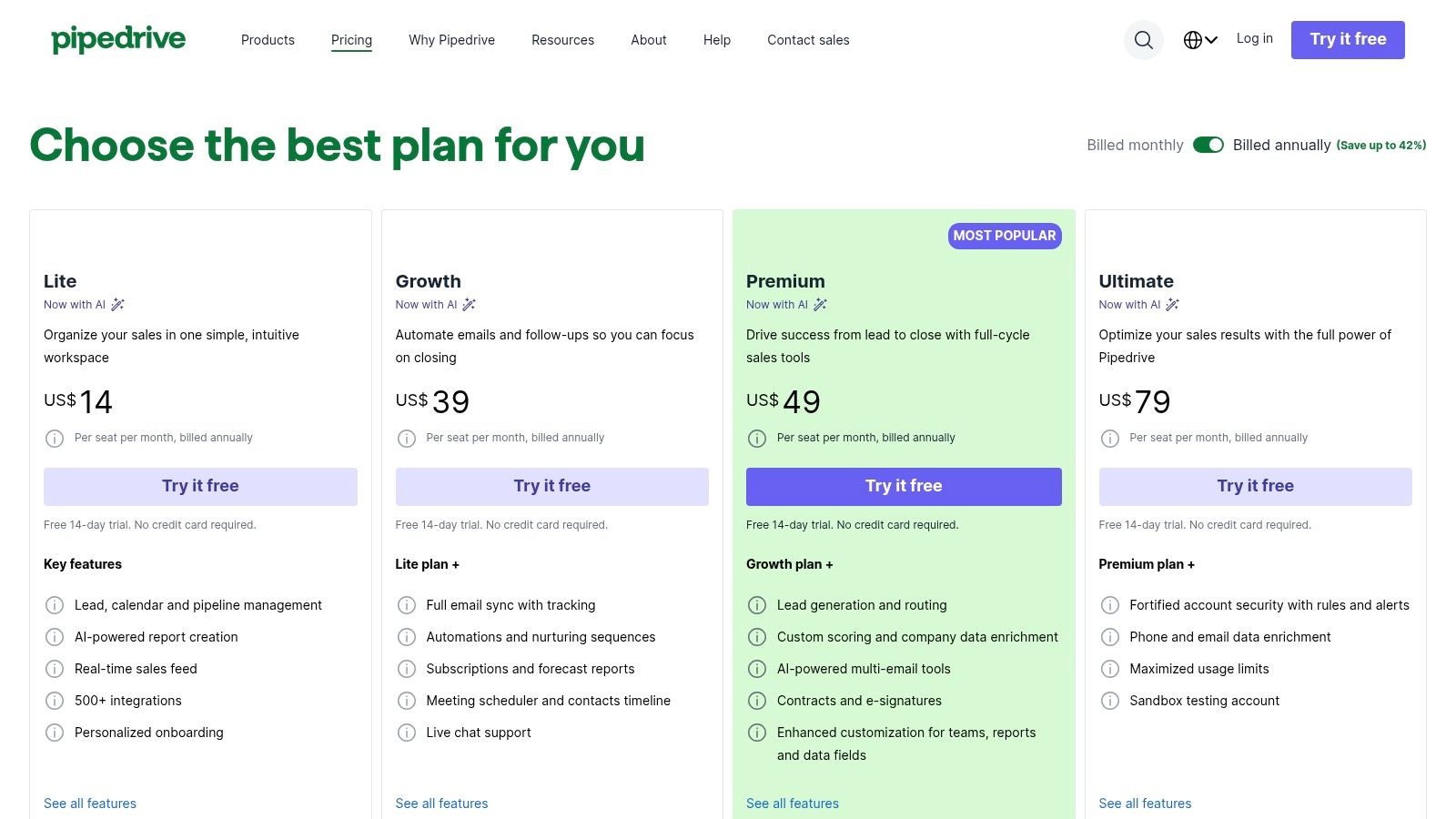
The platform’s built-in automation allows agencies to create rules that trigger actions, such as sending a follow-up email when a deal moves to a new stage or creating a task when a lead is assigned. While it's a strong standalone CRM, its value as one of the alternative salesforce automation tools comes from its ability to integrate with over 500 other applications, allowing agencies to build a customized, yet streamlined, tech stack.
Key Considerations for Sales-Focused Agencies
- Pricing Structure: Plans range from Essential ($14.90/user/month) to Enterprise ($99/user/month), with key automation and integration features available on the Advanced tier and higher. Add-ons for lead generation and project management are available for an extra fee.
- Best For: Small to mid-market agencies that prioritize user experience and a visual approach to sales pipeline management without the complexity of an enterprise-level system.
- Pros: Very easy to adopt, transparent pricing with a 14-day free trial, and good automation and reporting capabilities are available at mid-tier plans.
- Cons: Lacks a permanent free plan, and some critical features for agencies, like project management, require purchasing additional paid add-ons.
Website: pipedrive.com
7. Freshsales by Freshworks: For Unifying Agency Sales and Communication
Freshsales offers a value-driven alternative for agencies seeking a CRM with strong, out-of-the-box communication and automation features. It integrates multichannel engagement tools like chat, email, and phone directly into the platform, allowing agency sales teams to connect with prospects without juggling multiple apps. This all-in-one approach simplifies the sales process, making it easier to track every interaction from first contact to project kickoff.
The platform is designed for ease of use, enabling agencies to quickly build automated workflows for tasks like lead assignment, email sequences, and internal notifications. Its AI-powered deal insights and lead scoring help teams prioritize high-value opportunities, ensuring account managers focus their efforts effectively. For agencies needing an efficient CRM that aligns sales and marketing without the steep learning curve of more complex systems, Freshsales provides a compelling solution.
Key Considerations for Agencies Using Freshsales
- Pricing Structure: Offers a free plan for small teams. Paid tiers range from Growth ($15/user/month) to Enterprise ($69/user/month), with higher plans unlocking advanced AI, workflows, and customization.
- Best For: Small to mid-sized agencies that need an affordable, all-in-one CRM with strong built-in communication tools and straightforward sales automation.
- Pros: Value-oriented pricing with a generous free tier, excellent native communication tools, and a user-friendly interface that simplifies onboarding for new sales reps.
- Cons: Advanced features like sandbox environments and granular field permissions are reserved for the highest tier, and add-on costs for things like bot sessions can apply.
Website: freshworks.com
8. Outreach: For Enterprise-Grade Sales Engagement at Scale
Outreach is an enterprise-grade sales engagement platform designed to scale high-volume outbound and inbound sales motions for agencies. It excels at orchestrating complex communication cadences, known as "Sequences," that combine email, calls, and social touches into a single, automated workflow. For agencies managing large teams of SDRs or account executives, Outreach provides the structure and data needed to ensure consistent, high-quality client engagement and prospecting at scale.
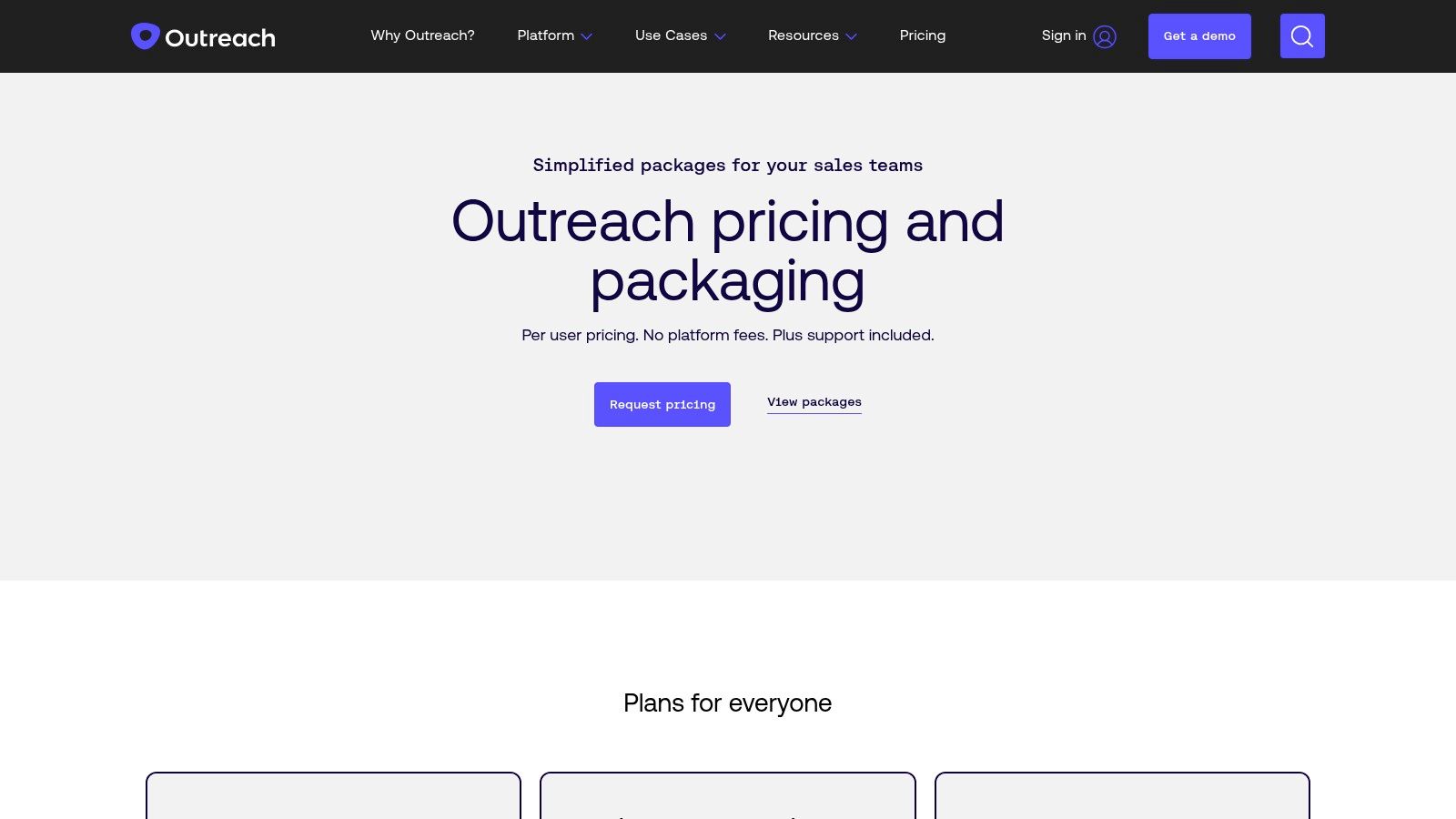
The platform’s deep, bi-directional Salesforce sync is a key differentiator, ensuring that all activities are logged correctly without manual data entry. Its AI assistant, Kaia, provides real-time coaching during calls and delivers automated summaries, a powerful feature for training and quality assurance. This focus on AI-driven insights ties into the broader trend of what conversation intelligence is and how it can improve sales performance. Outreach is one of the most powerful Salesforce automation tools for agencies focused on repeatable sales processes.
Key Considerations for Large-Scale Agencies
- Pricing Structure: Pricing is available by quote only, positioning it for the mid-market and enterprise segments. Expect a significant investment compared to more basic tools.
- Best For: Larger agencies with dedicated sales operations teams (SDRs, AEs) that need a robust, scalable platform for managing complex outbound and inbound sequences.
- Pros: Enterprise-grade governance and coaching capabilities, one of the deepest Salesforce integrations available, and proven scalability for demanding sales workflows.
- Cons: The platform requires significant effort for implementation and enablement. Its complexity and cost make it less suitable for smaller agencies or those without dedicated sales ops resources.
Website: outreach.io
9. Salesloft: For Data-Driven Sales Cadences and Pipeline Management
Salesloft is a comprehensive sales engagement platform designed to help agencies build a predictable pipeline and close deals more efficiently. It excels at structuring and automating multi-channel outreach through its Cadence feature, allowing agency sales teams to execute personalized communication at scale. By combining email, calls, social touches, and other steps into a single automated workflow, it ensures no lead falls through the cracks and every prospect receives timely, relevant follow-up.
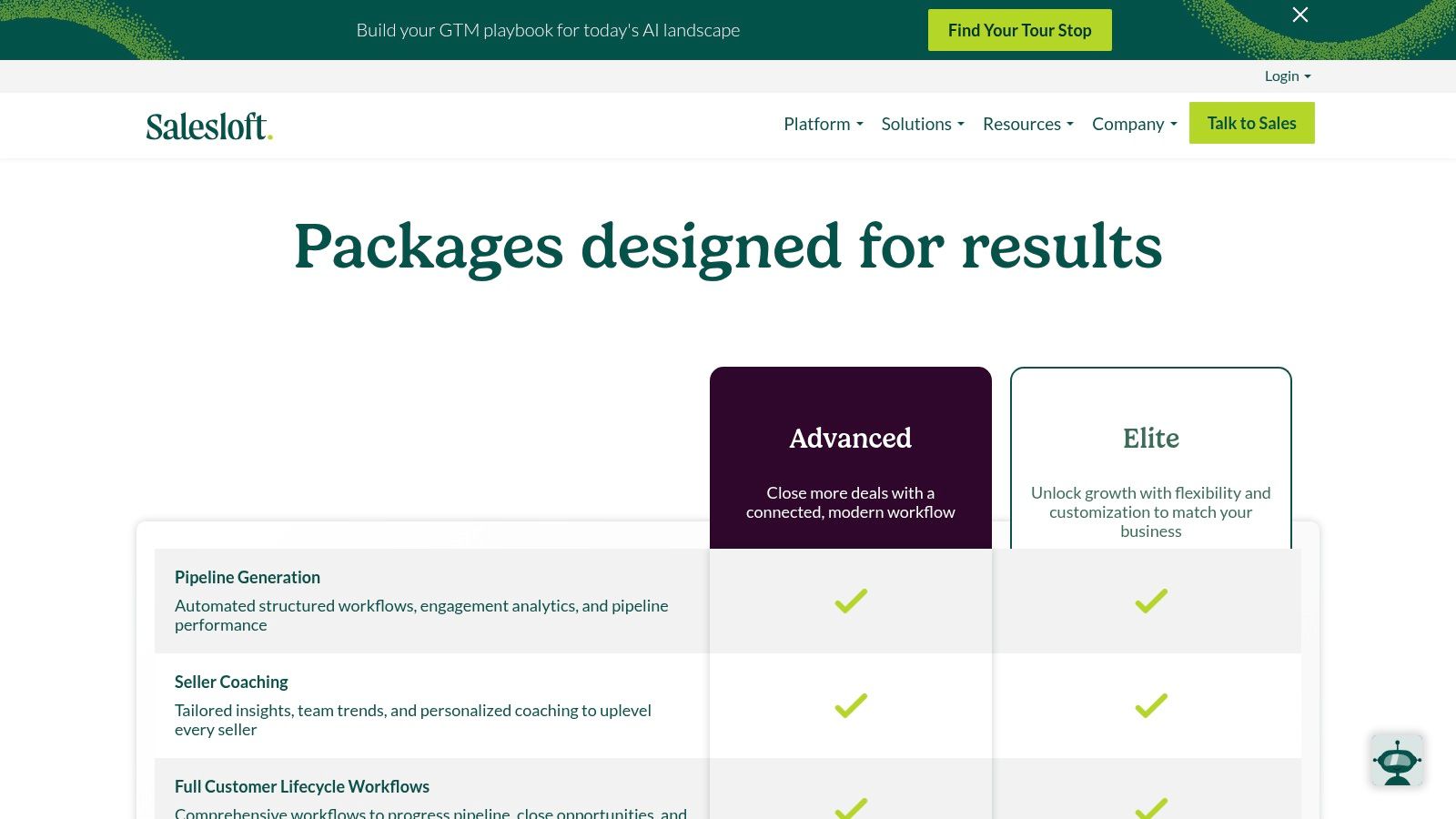
The platform’s deep, bi-directional sync with Salesforce makes it a powerful extension for any agency's tech stack. All activities, notes, and engagement data are logged back to the appropriate contact or lead record, enriching the CRM with critical insights. This integration turns Salesforce from a simple database into a dynamic system of record for all client-facing interactions, making Salesloft one of the most effective Salesforce automation tools for teams focused on proactive outreach and deal acceleration.
Key Considerations for Data-Focused Agencies
- Pricing Structure: Pricing is provided upon request and is customized based on team size and required features, typically involving an annual contract.
- Best For: Mid-market to enterprise agencies that need a structured, scalable, and data-driven approach to sales engagement and pipeline management.
- Pros: It’s a widely adopted and mature platform with strong coaching and analytics features that provide deep visibility into what’s working across the revenue team.
- Cons: The total cost can be significant, and achieving optimal results requires a commitment to building and maintaining well-designed sales processes and administrative oversight.
Website: salesloft.com
10. Close: For High-Velocity, Communication-Heavy Sales Teams
Close is an all-in-one sales CRM built for speed, making it a strong contender for agencies with high-volume outreach needs. Its core strength lies in unifying multi-channel communication-calling, SMS, and email-into a single, efficient workflow. For agencies focused on rapid lead qualification and appointment setting, Close consolidates essential tools, reducing the need to switch between different applications and streamlining follow-up cadences.
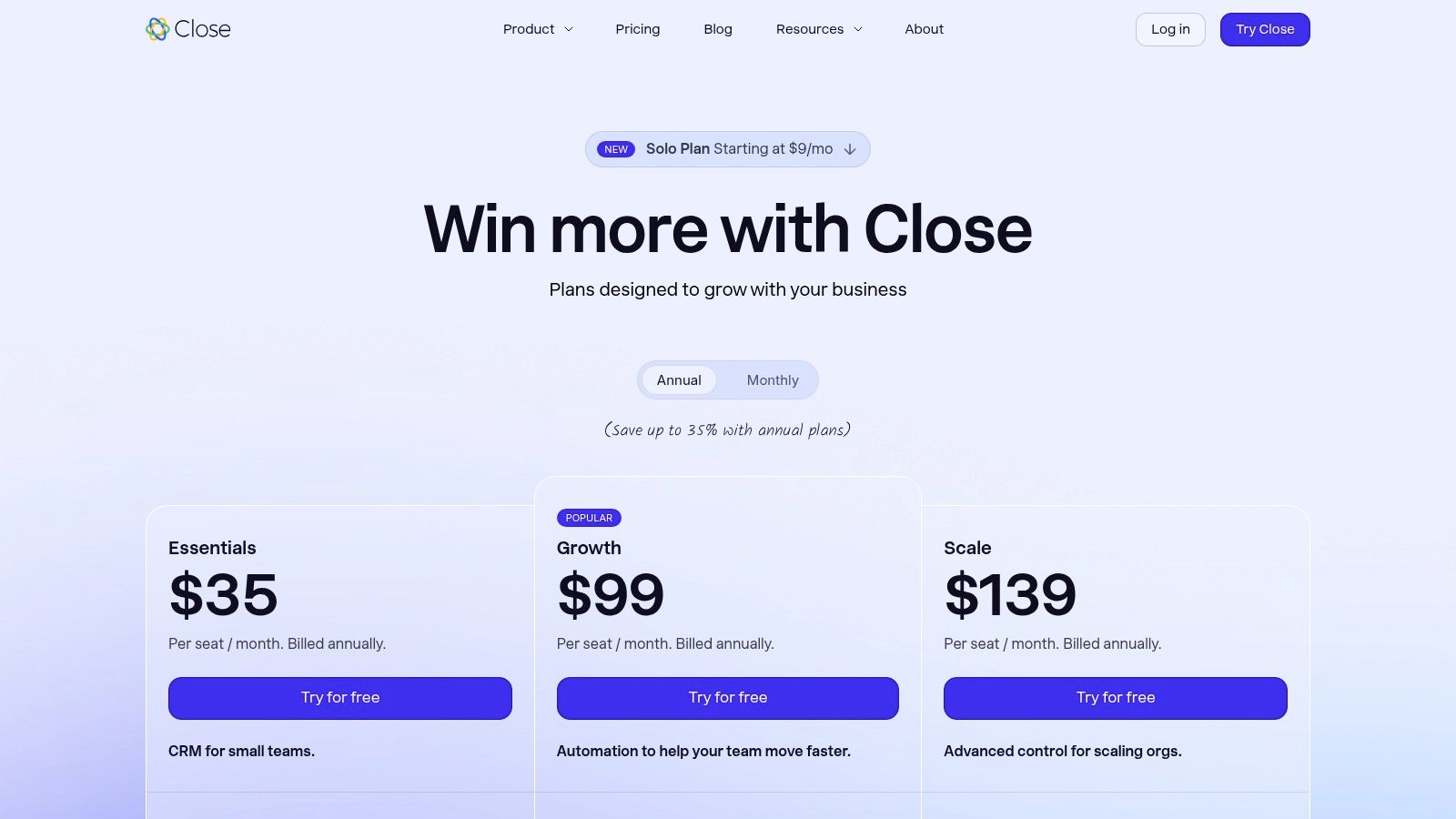
The platform integrates powerful communication features directly into the CRM, including built-in Power and Predictive Dialers at higher tiers. This makes it one of the most effective salesforce automation tools for teams that live on the phone. Agencies can set up automated email and SMS sequences, manage tasks, and track every interaction without ever leaving the Close interface, ensuring reps spend more time selling and less time on administrative tasks.
Key Considerations for High-Volume Agencies
- Pricing Structure: Plans range from Startup ($99/user/month) to Business ($149/user/month), with features like the predictive dialer and call coaching reserved for the higher tier.
- Best For: Small to mid-sized agencies with high-velocity sales teams that prioritize calling and multi-channel outreach as their primary sales motion.
- Pros: Extremely fast setup and user-friendly interface lead to quick adoption, transparent pricing is easy to understand, and its native telephony features are robust.
- Cons: Advanced analytics and customization are limited compared to enterprise-grade CRMs, and usage-based telephony costs can add up for call-heavy teams.
Website: close.com
11. Salesforce AppExchange: For Extending Your Agency's CRM Capabilities
The Salesforce AppExchange is the official marketplace for extending your CRM’s functionality, acting as an essential resource for agencies seeking specialized Salesforce automation tools. Instead of building custom solutions from scratch, agencies can browse thousands of pre-built apps designed to solve specific challenges like advanced lead routing, document generation, or commission tracking. It’s the fastest way to fill functionality gaps and enhance your sales force automation capabilities without extensive development.
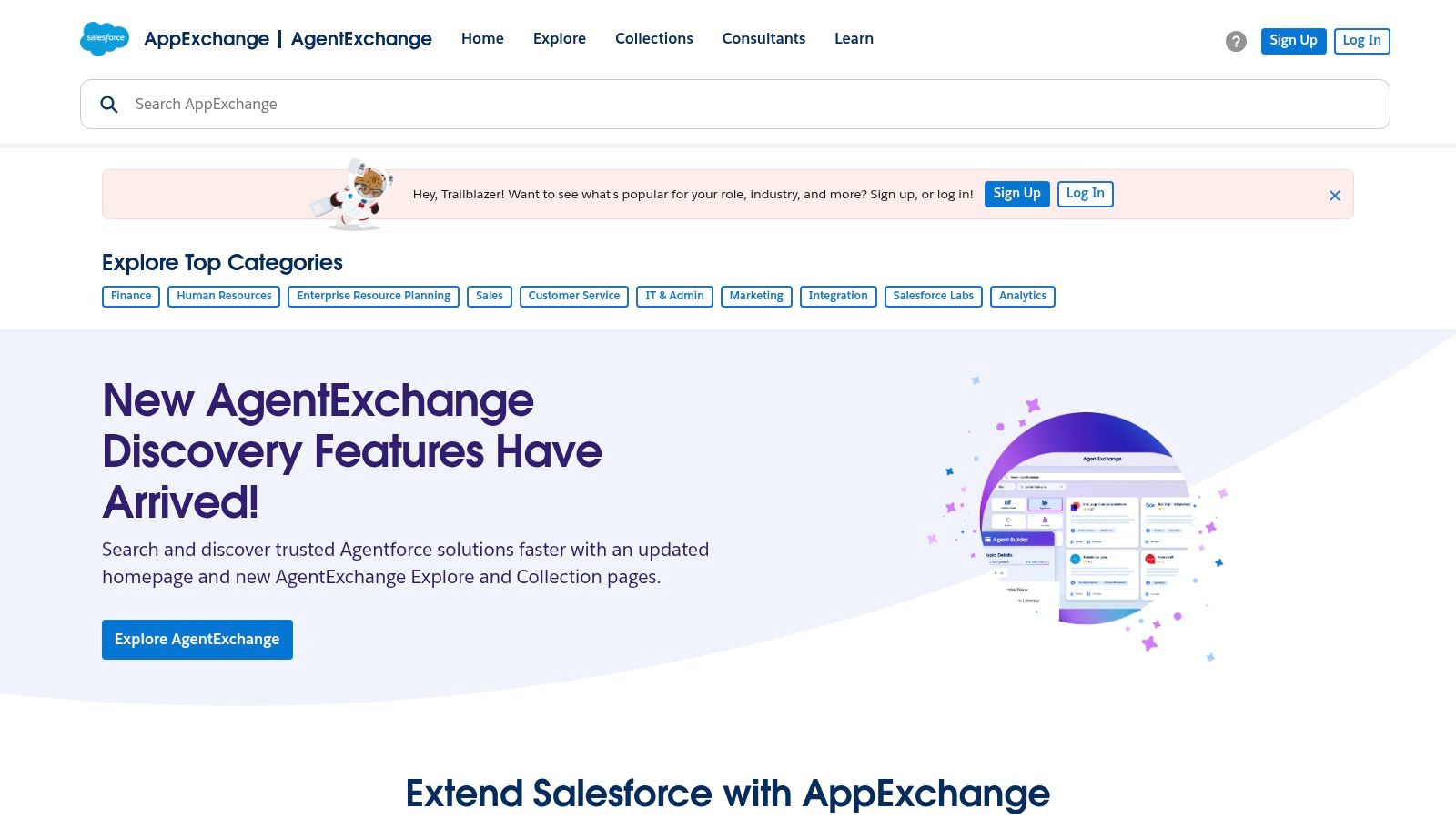
For agencies, this means you can quickly find a tool to automate client onboarding paperwork or integrate a specialized dialer for your sales team. The platform features curated collections and user reviews, which help de-risk the selection process and ensure you find a reliable solution that integrates seamlessly into your existing Salesforce environment. Think of it as a strategic toolkit for tailoring your CRM to your agency's precise operational needs.
Key Considerations for Agencies Using AppExchange
- Pricing Structure: Varies widely by app. Many offer free trials or freemium versions, while others have per-user, per-month subscriptions or one-time license fees.
- Best For: Agencies of all sizes looking to plug specific automation gaps without custom development, from installing a simple e-signature tool to a complex CPQ solution.
- Pros: A massive one-stop marketplace for vetted Salesforce apps, ratings and reviews to guide selection, and both native and partner solutions to quickly enhance SFA.
- Cons: The sheer number of options can be overwhelming, and some apps have complex pricing and edition dependencies that require careful vetting to ensure compatibility.
Website: salesforce.com/solutions/appexchange/apps/
12. G2: For Vetting and Comparing Agency Automation Tools
G2 serves as a critical research hub for agencies evaluating new software, and its Sales Force Automation category is the definitive starting point for vendor discovery. Instead of being a single tool, it’s a marketplace of vetted options, allowing agency leaders to compare dozens of Salesforce automation tools based on real user reviews. This is where you can validate a vendor's marketing claims against actual user experiences, ensuring the tool you choose fits your agency’s specific operational needs and client service model.
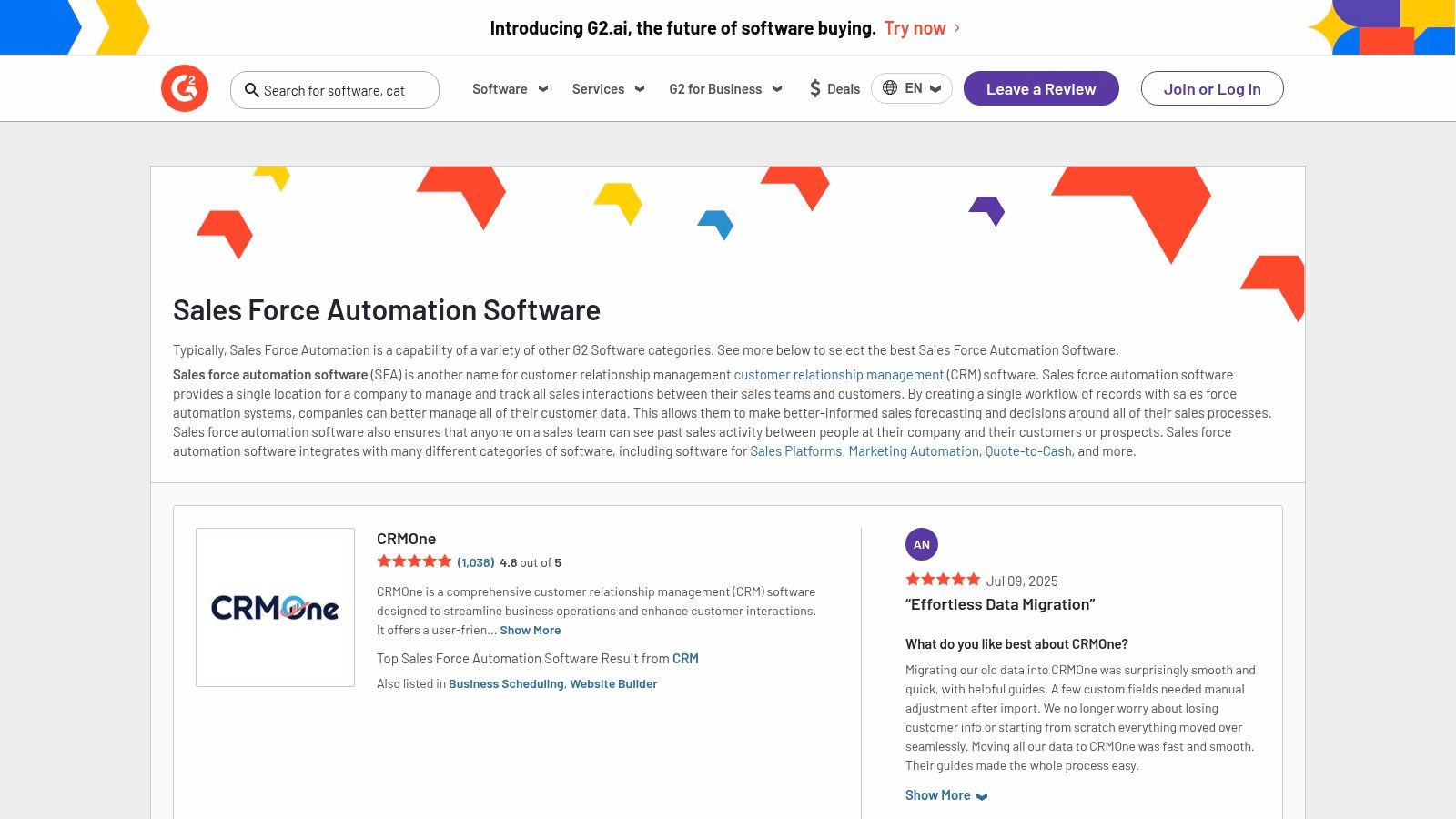
The platform’s strength lies in its Grid and Leader reports, which visually map out market leaders, contenders, and niche players. For an agency, this provides a quick way to shortlist potential tools, filter by company size to see what similar-sized agencies are using, and access pricing snapshots. It streamlines the otherwise time-consuming process of initial research and vendor vetting.
Key Considerations for Agencies During Research
- Pricing Structure: Access to reviews and reports is free. Pricing for the software listed varies by vendor, but G2 often provides helpful snapshots and links to vendor pricing pages.
- Best For: Agencies in the evaluation and discovery phase of their software buying journey, looking to build a shortlist of tools based on peer reviews and market data.
- Pros: The sheer volume of current, verified user feedback is invaluable. It helps uncover both major and niche vendors and provides an unbiased view of a tool's capabilities.
- Cons: Pricing information can sometimes be outdated, and sponsored vendor placements may influence the visibility of certain tools in search results.
Website: g2.com/software/sales-force-automation
Salesforce Automation Tools: Feature & Pricing Comparison for Agencies
How to Choose the Right Automation Stack for Your Agency's Growth
Navigating the landscape of Salesforce automation tools can feel overwhelming, but the journey to a more efficient and profitable agency begins with a clear understanding of your unique challenges. As we've explored, the market offers everything from comprehensive CRM platforms like Salesforce Sales Cloud and HubSpot to specialized sales engagement tools like Outreach and Salesloft. The ultimate goal isn't to adopt every tool available, but to strategically assemble a tech stack that directly addresses your agency's most significant bottlenecks and growth opportunities.
Your selection process should be rooted in a deep analysis of your current workflows. Where do your account managers and sales reps lose the most time? Is it manually updating Salesforce records after a client pitch, struggling to maintain consistent follow-up sequences, or failing to capture critical insights from discovery calls? Answering these questions will guide you toward the right solution. A large agency with complex, multi-stage client projects might benefit from the robust, customizable ecosystem of Salesforce, while a smaller, fast-moving creative agency might find Pipedrive's visual sales pipeline more intuitive for managing new business.
Key Factors for Your Agency's Automation Strategy
When evaluating which Salesforce automation tools to integrate, consider these critical factors:
- Integration Depth: A tool's true power lies in how seamlessly it connects with your core CRM. Look for native integrations or robust API support that ensures data flows automatically and accurately, preventing the creation of information silos. A poorly integrated tool can create more manual work than it saves.
- Scalability: The tool you choose today must support your agency's growth tomorrow. Ask potential vendors about their tiered plans, user-based pricing, and ability to handle an increasing volume of client data and user activity without a drop in performance.
- User Adoption: The most powerful software is useless if your team doesn't use it. Prioritize tools with an intuitive user interface, excellent training resources, and a clear value proposition for the end-user. Involve your team in the trial process to get their buy-in early.
- Solving a Core Problem: Instead of chasing a long list of features, focus on tools that solve a specific, high-impact problem. If inconsistent meeting notes and manual data entry are crippling your team's productivity, a purpose-built tool like Scribbl offers a more targeted and effective solution than a general-purpose project management app.
Building Your Agency's Automated Future
The right automation stack does more than just save a few hours each week; it fundamentally transforms your agency's operational capacity. It empowers your team to focus on what they do best: building strong client relationships, delivering creative solutions, and strategically growing accounts. By automating the administrative burden, you free up valuable mental and temporal resources for high-value activities.
This shift allows you to deliver a superior client experience, as your team becomes more responsive, informed, and proactive. The path to a truly automated agency is an iterative one. Start by identifying and solving your biggest pain point, measure the impact, and then expand your stack thoughtfully. The ultimate aim is not just to automate tasks, but to build an automated system for excellence that drives sustainable growth.
Ready to eliminate the biggest data entry bottleneck in your agency's sales process? See how Scribbl uses AI to automatically capture notes from your client calls, generate summaries, and sync critical insights directly into Salesforce. Visit Scribbl to reclaim your team's time and ensure no client detail ever falls through the cracks again.




